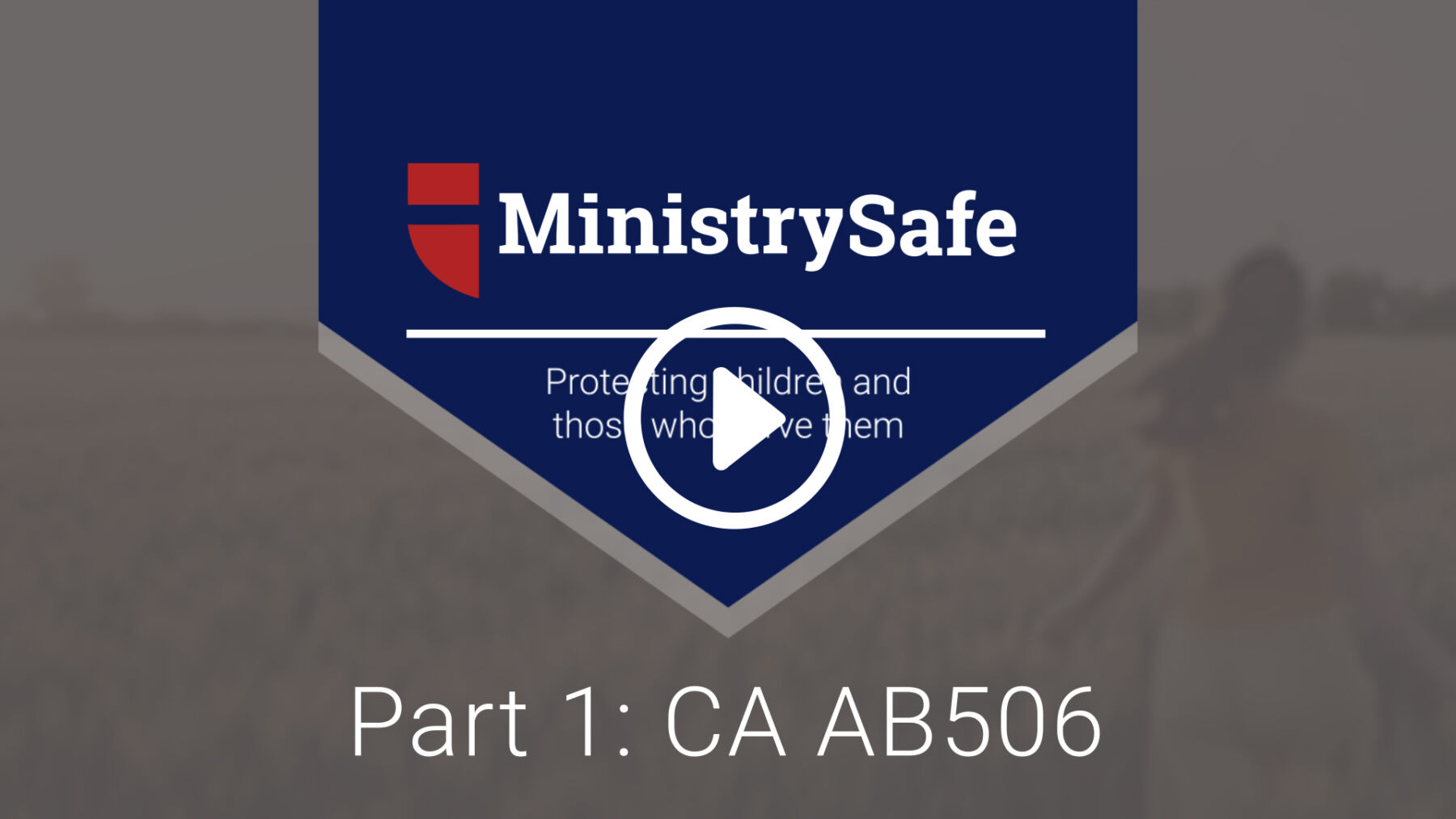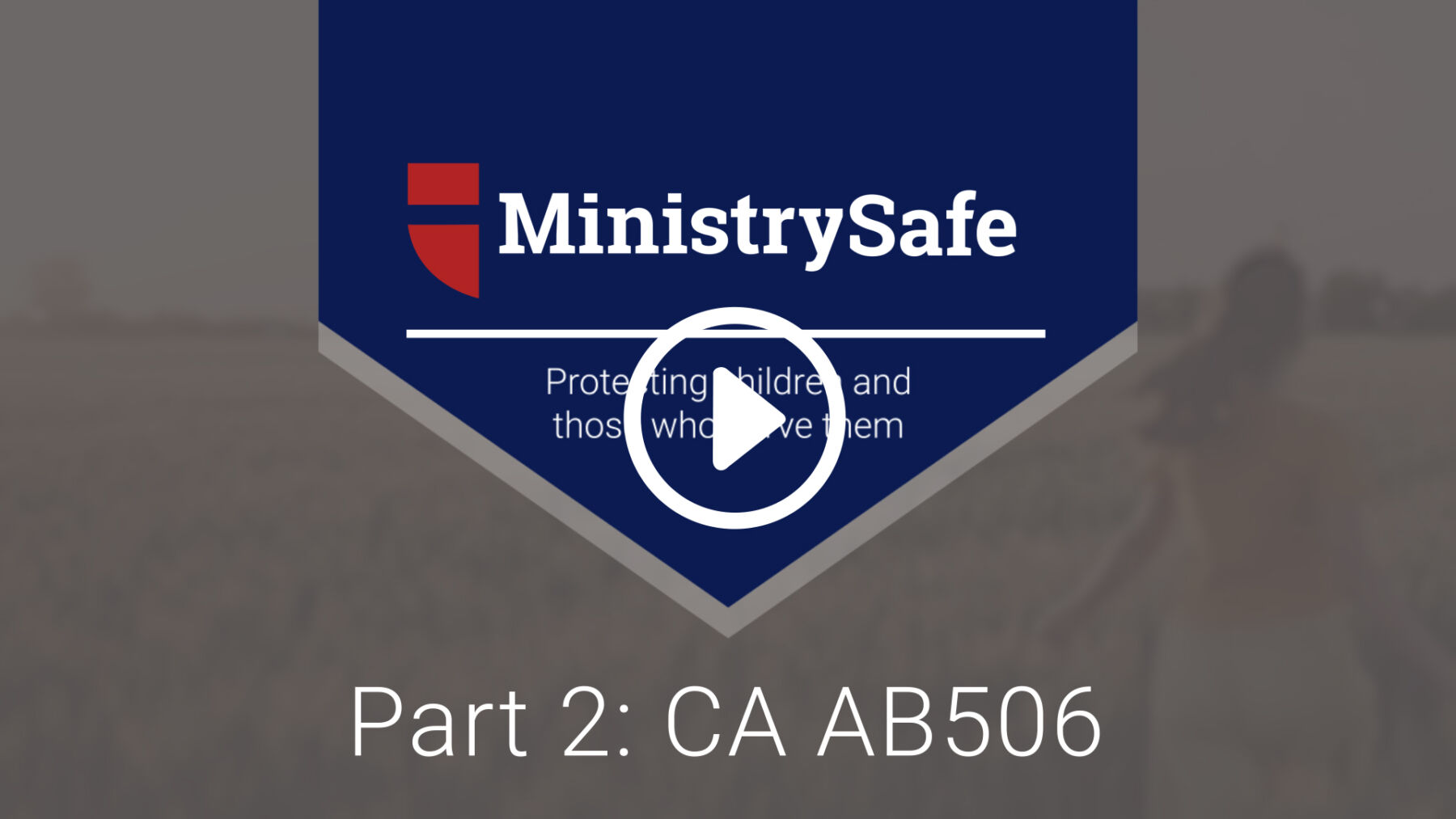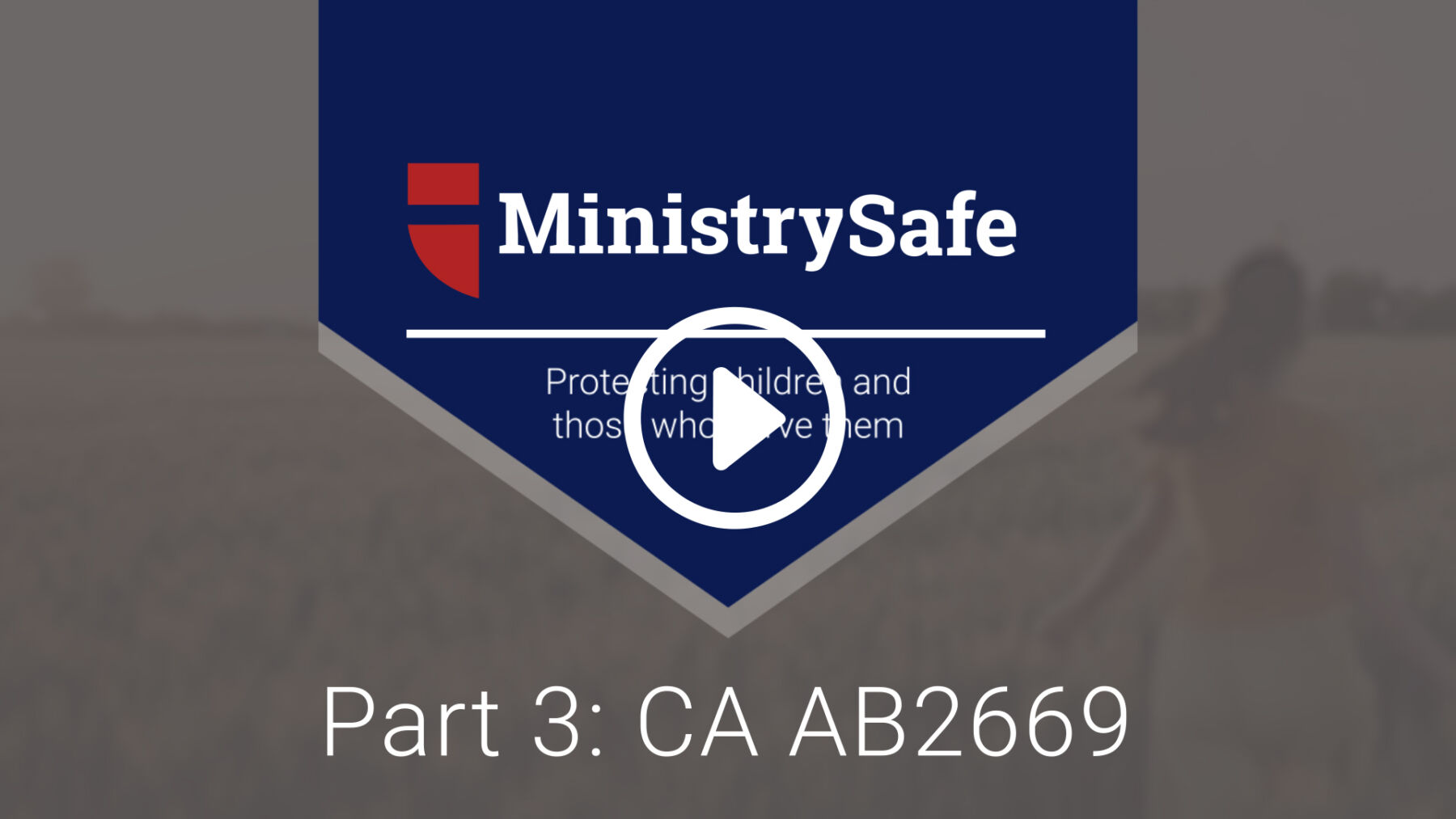California Sexual Abuse Legislation
Assembly Bill 506 (AB506) — Effective January 1, 2022
Assembly Bill 2669 (AB2669) – Effective September 6, 2022
Requirements for ‘Youth Service Organizations’
Materials on this page were last updated in January 2023



Related Resources:
Become a MinistrySafe Member Today
FAQs:
A: Though AB506 was a response by the California legislature to a child sexual abuse crisis, training required under the new law is not limited to sexual abuse. AB506 modifies the California Business & Professions Code by adding Section 18975, Chapter 2.9(a): “An administrator, employee, or regular volunteer of a youth service organization shall complete training in child abuse and neglect identification and training in child abuse and neglect reporting. The training requirement may be met by completing the online mandated reporter training provided by the Office of Child Abuse Prevention in the State Department of Social Services.” [emphasis added]
Department of Social Services Training (Mandated Reporter Training)
As clearly expressed in the new law, a Youth Service Organization may satisfy the new training requirement by simply directing administrators, employees and regular volunteers to the Department of Social Services Mandated Reporter Training.
Alternative Compliant Trainings
Though AB506 leaves the door open to alternative training, neither AB506 nor the California Business & Professions Code has an oversight entity or training approval process. Youth Service Organizations seeking alternative training must ensure that any training alternative addresses the topics covered by the Department of Social Services’ training for mandated reporters. For example, an alternative training must address topics beyond child sexual abuse (i.e., physical abuse, emotional abuse, bullying, neglect, etc.) AND describe California reporting requirements and processes.
MinistrySafe and Abuse Prevention Systems provide an extensive library of abuse prevention training, including Sexual Abuse Awareness Training, supplemented to include the content addressing other forms of abuse AND California reporting requirements and processes.
Access sample Awareness Training complying with AB506.
A: Short answer: all employees, regardless of role.
With respect to training, AB506 creates Section 18975(a):
An administrator, employee, or regular volunteer of a youth service organization shall complete training in child abuse and neglect identification and training in child abuse and neglect reporting.
There is no ‘category’ of employees – those who work with children vs. those who do not. Volunteers appear to be treated differently. Like employees, regular volunteers shall complete training: a regular volunteer is defined by role and hours working with youth – either monthly or annually (see Section 18975(e)(1)).
Best practice: all employees and volunteers of the Youth Service Organization should be required to complete training in child abuse and neglect identification and reporting.
A:
You must rerun the search under your Live Scan account and ORI number.
Rationale:
Pursuant to Section 18975(b), an administrator, employee, or regular volunteer of a youth service organization must undergo a background check pursuant to Section 11105.3 of the [California] Penal Code (a ‘Section 11105.3 Search’). There is no current provision allowing a youth service organization to use the background check performed by another entity.
The ‘Section 11105.3 Search’ is a continuous search; this means the initial search will reveal records available from the CA DOJ at the time requested AND provide ongoing reports in the event the fingerprinted person has any future criminal records that become available. The Section 11105.3 Search has limitations and weaknesses (see AB506 Analysis); one of the few strengths is an ongoing stream of reporting about an individual to the organization– associated with an ORI number. This explains why there is no provision in AB506 for periodically refreshing or renewing criminal background checks: the Section 11105.3 Search will automatically provide additional records as they are introduced into the California DOJ system.
If an organization relies on the Section 11105.3 Search as performed by another organization, the organization faces at least two significant challenges:
First, it is never appropriate to allow a candidate to bring an already-performed background check. This creates too much opportunity for manipulation or fabrication.
Secondly, the organization initially running the search (Organization 1) will receive all updated information as records become available: Organization 2 will not receive any notification or information. Instead, this information will be communicated to the organization associated with the underlying ORI number (Organization 1).
Keep in mind that every child-serving organization in California must undertake a reasonable search related to any candidate’s past criminal behavior. The Section 11105.3 Search (CA Live Scan) is limited to California records and does NOT include a search of the California or national sex offender registries. In addition to performing the Section 11105.3 Search, it is best practice to perform a nationwide database search and a search of the sex offender registries, at a minimum. This search should be periodically refreshed unless ordered as a continuous search. To learn more about the Continuous Monitoring option in a nationwide search, contact us: [email protected].
Policies requiring, to the greatest extent possible, the presence of at least two mandated reporters whenever administrators, employees, or volunteers are in contact with, or supervising, children.
A: Caveat: AB506 was not written with precision; as a result, technical compliance is difficult. The guidance below is not legal advice: rather, it is an attempt to understand and apply legislative intent in circumstances where technical compliance is unclear (or infeasible) for many Youth Service Organizations.
Guidance: In its simplest form, Section 18975(c)(2) requires the Two-Adult Rule; a child protection policy requiring that two adults be present and supervising all services to children or youth. In general, all child-serving organizations should avoid or prohibit unobserved one-on-one interactions between a single adult and a single child.
The purpose behind Section 18975(c)(2) is fairly straight-forward. Preferential Offenders, offenders who prefer a child as a sexual partner, pose a significant risk to Youth Service Organizations. Almost without exception, Preferential Offenders have an age and gender of preference – an age range and gender of child preferred by the offender for sexual interaction. Child-serving organizations become an attractive target for the Preferential Offender, as the organization has gathered the children for him (or her). These offenders engage in the grooming process, the process by which an offender gains access to children within his age and gender of preference, grooms a child for inappropriate sexual touch, then keeps the child silent.
To groom a child for inappropriate sexual touch, the offender creates opportunities for trusted time alone with the child. The Two-Adult Rule is an attempt to add additional supervision in child-serving contexts, thereby limiting opportunity for inappropriate interaction. AB506 addresses this reality through a combination of training – Section 18975(a) – and policies – Section 18975(c)(2).
Section 18975(c)(2) requires that Youth Services Organizations maintain the presence of at least two adults ‘to the greatest extent possible’.
Unfortunately, this is not how the code section reads. Technically, the code requires the presence of at least ‘two mandated reporters’. Because AB506 does not add to the list of mandated reported found in CA Penal Code Section 11165.7, this policy requirement creates a conundrum:
*I have two adults present, but they are not ‘mandated reporters’ listed in the CA Penal Code. To comply, must we recruit adults who are ‘mandated reporters’ under current CA law?
*If my staff members and volunteers have been trained consistent with AB506 training requirements, will THESE two adults satisfy the new policy requirement?
For many Youth Service Organizations, it is infeasible to recruit mandated reporters – especially organizations who rely heavily on volunteers.
At this point, we believe it is important to revisit the purpose of the law: prevent child sexual abuse in Youth Service Organizations through training and policies. Through Section 18975(a), all administrators, employees and regular volunteers are required to receive training in abuse identification and reporting. In essence, all administrators, employees and regular volunteers must be equipped with the training required for existing ‘mandated reporters’. Though AB506, does not technically add administrators, employees and regular volunteers to the list of ‘mandated reporters’, they now have training to function as mandated reporters.
After training all administrators, employees and regular volunteers, all Youth Service Organizations should create policies that require the presence of two trained adults. Sample Policies & Procedures available through MinistrySafe and Abuse Prevention Systems (APS) incorporate the Two-Adult Rule, as well as other policy concepts related to the abuser’s grooming process and common grooming behaviors. In addition, policies should clearly express reporting requirements and processes that ensure all suspicions of allegations of abuse and neglect are reported to relevant child protection or law enforcement authorities, pursuant to Section 11165.9 of the CA Penal Code.
As always, when in doubt, seek competent legal advice.
A: AB506 does not add any additional category to the list of California mandated reporters found in CA Penal Code Section 11165.7(A). Best practice: require all individuals working with children to report – internally and (when appropriate) to authorities– regardless of whether specifically listed as mandated reporters under California law.
A: AB506 requires that all administrators, employees and ‘regular volunteers’ shall undergo a Section 11105.3 background search, which requires fingerprinting. Because there is nothing in the new law that makes this a requirement only after an effective date, it should be understood to make the fingerprint-based background check a requirement for all administrators, employees and regular volunteers, regardless of when they undertook their respective role.
A: The orientation of the new law is aimed at organizations in California. If the organization operates in California, the organization must comply.
Compliance requires training staff members and volunteers* regardless of whether these individuals live outside the state of California. Keep in mind, the purpose of the legislation is to protect children in California Youth Service Organizations.
A: The orientation of the new law is aimed at organizations operating in California. An organization located outside California is required to follow legal requirements in its respective state. AB506 does not create a training requirement for paid staff members and volunteers that serve in an organization outside the state of California. Keep in mind, the purpose of the legislation is to protect children in California Youth Service Organizations.
A: The orientation of the new law is aimed at organizations operating in California, and Youth Service Organizations operating in California must comply. An organization located outside California is required to follow legal requirements in its respective state. AB506 does not create a training requirement for paid staff members and volunteers that serve in an organization outside the state of California. Keep in mind, the purpose of the legislation is to protect children in California Youth Service Organizations. In addition, all child-serving organizations should be (1) training staff members and volunteers concerning child abuse prevention and reporting; (2) performing Criminal Background Checks; and (3) implementing policies that require – at a minimum – the two-adult rule.
Sign up to start implementing the MinistrySafe 5-Part Safety System
in your ministry today!
ADDITIONAL MINISTRYSAFE RESOURCES:
Child Sexual Abuse and Insurance Coverage - Avoiding Common Pitfalls
Child Sexual Abuse in Ministry Contexts - Understanding the Risk
Preventing Child Sexual Abuse - An Effective Safety System
Effective Screening - Keeping the Wolf Out of the Sheep Pen
Criminal Background Checks - Not a Silver Bullet!
Reporting Abuse - The Church's Blindspot
Responding to an Allegation - How to Navigate a Sexual Abuse Crisis at Your Church
